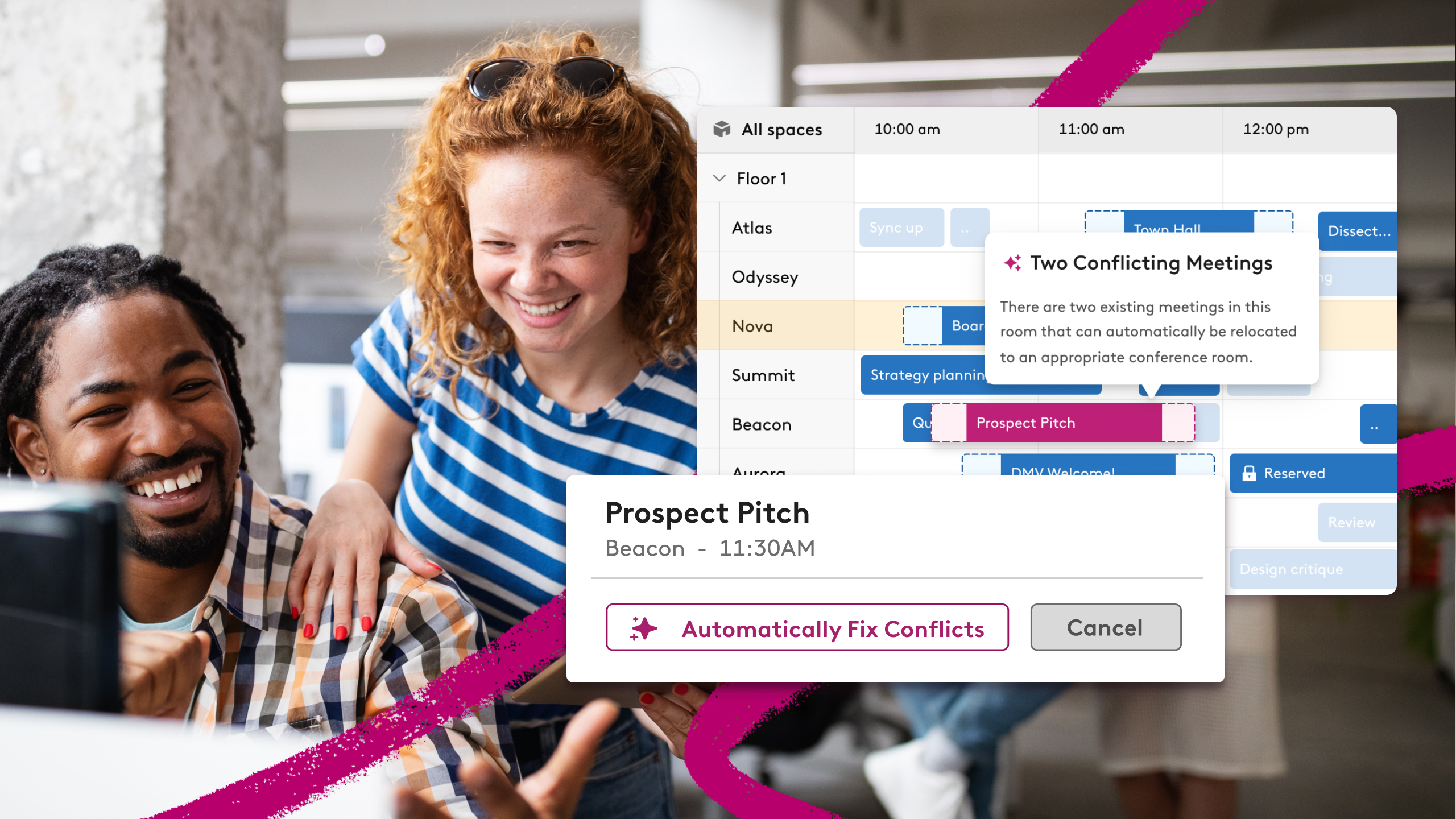What is Office Hoteling? How to Make Flexible Workspace

Many things have changed since the COVID-19 pandemic. We’re seeing more employees work from home at an increasing rate, become dependent on technology to do their jobs and embrace flexible routines.
With these new office rules come an increased need for flexibility and hybrid ready workplace strategies. It’s an excellent way to adapt to a changing workforce that’s always on the move and doesn’t need a permanent office to be productive.
In this blog post, you’ll learn everything to know about office and desk hoteling, from how it works to how you can get started with it yourself.
How does desk and office hoteling work?
First of all, let's clarify the difference between "office hoteling" and "desk hoteling". While sometimes used interchangeable, desk hoteling is when employees book a desk in a workplace in advance for a day or more. If that desk is in a private office, that can be called office hoteling. Office hoteling can also sometimes refer to renting office space in a coworking office space but usually it refers to space employees book before coming into a normal office.
Typically, desk hoteling (or office hoteling) is used in a flexible work environment with various types of seating strategies like hot desking or activity-based working.
Unlike a traditional work environment, office managers don’t have to assign seats to employees. It puts an end to the free-for-all model that most companies use to manage their desks.
The concept first started at a Chicago firm called Ernest and Young in 1989 and has been taking off ever since. It’s an office model already adopted by top companies such as LEGO, Citigroup, and Credit Suite to optimize their office.
Think of it the same way that you’d book a reservation at a hotel. Workers can book an available workplace in advance that’s the right fit for a certain period. Once they’re over and the desk is vacant, other employees can reserve the space later.
4 benefits of desk hoteling for your office
According to Global Workplace Analytics, the modern employee is mobile around 50% to 60% of the time. As top companies worldwide are adopting a more flexible approach to office life post-pandemic, desk hoteling is going to be key for creating a thriving, healthier workplace.
Still not convinced? Here are some of the vital benefits that come with adopting a desk hoteling model for your workplace strategy:
Better office space management
Maximizing office space is a real headache for many offices. With desk hoteling, not only do you eliminate unnecessary real estate, you’ll be saving money on overhead costs.
For example, if an employee works the majority of time at home, there’s no point in assigning them a seat and renting space. With fewer desks in the office, you’ll be making major savings that you can invest in your company.
If you know that specific rooms are frequently left empty, you can put them to better use instead. You can turn those spaces into lounges for employees to chill and have a chat, or even cafeterias for lunch.
There are software tools that provide you with analytics on your space utilization. For example, Robin gives you access to workplace analytics to better understand your team’s needs. It allows you to identify patterns in occupancy and make data-driven decisions.
Equal access to office resources for everyone
The office can be an unpredictable environment at times.
Some meetings may take longer than expected, which leads to rooms being unavailable for long periods. There might also be employees who are rushing to meet a deadline and end up hoarding all the office supplies.
As a result, getting access to resources can be challenging for employees. Without the right supplies, their tasks become longer to complete, and they can end up frustrated.
Desk hoteling solves these conflicts with fair access to resources in the office. Employees will get fair control over desks, equipment, and supplies for use whenever they need it.
You won’t hear complaints from employees about a lack of resources to do their jobs ever again. Companies may even save money on supplies once they notice that they don’t have to spend as much money on items such as paper, pens, or light bulbs.
Improved productivity and teamwork between employees
Desk hoteling improves employee productivity in many ways.
By allowing team members to book a desk or workstation early, they can get to work instantly and not waste any time. Long gone are the days when employees have to scramble to find a free space in the office.
Certain projects also require specific employees from different departments to collaborate. Allowing your team to book their desk simplifies the process and makes it more convenient for collaboration. They’ll be able to always find the perfect meeting room.
As a result, you’ll see employees become more productive and deliver higher quality work. It will create an environment where everyone can be the best at what they do.
Flexible and hybrid work ready
It’s worth noting that each employee has a different style of working. Some thrive in closed private spaces, while others may do their best in an open office environment.
You also have employees that are very productive when working at home and don’t feel the need of showing up to an office each day. In fact, many workers plan to continue WFH even when the pandemic is over.
Desk and office hoteling helps you adapt to each worker by offering them the flexibility they seek to work on their own terms. If a mobile employee wants a mix of office work and WFH, for example, they can book a desk for a couple of days and stay at home for the remainder of the week.
The freedom that comes with desk hoteling will help your employees feel more satisfied at their position. It’s going to help you retain them long-term and create a better work environment for everyone.

How to implement office hoteling
While office hoteling comes with plenty of benefits, the right execution is vital to making it work. There are certain things to take into account like your employees’ expectations and any new policies you'll need to roll out.
To help you out, here are our best tips so you can get started with office hoteling on the right foot:
Make sure that all employees are on board
Change is always challenging to go through. Before adopting an office hoteling model, you’ll want to create a thorough change management game plan to make sure the transition to this new way of working is seamless.
Start by explaining the benefits that come with desk hoteling. Explain to them how it’s going to offer more flexibility, freedom, and a better employee experience so they can be more efficient at their jobs.
Make sure to take into account the different expectations of employees as well. If you can, find employees in your team who can become advocates and spread the word to other people.
Offer a diverse choice of rooms and workstations
Next, for a more flexible work environment, you want to focus on creating a mixture of spaces.
For example, you want to assign a space for your marketing team’s brainstorming sessions. You also create different rooms where employees can relax, take a coffee break, and chat.
Don't forget about creating workstations where employees can have private phone calls. It’s also vital to create storage spaces where they can store their belongings since they won’t have a permanent desk anymore.
Review your office etiquette
Desk booking comes with new rules on how your company manages its office. Making the switch to office hoteling means you’ll have to take another look at your workplace etiquette.
For example, you must establish rules on cleaning and decluttering desks. Your employees must keep the space tidy, remove personal items once they leave, and avoid eating lunch or leaving confidential documents on the desk.
Your company must also have its responsibilities. Employees must be equipped with the technology to do their jobs effectively, adopt new flexible working policies, and have enough desks for team members.
The new office etiquette will serve as a roadmap of how your team adopts office hoteling. If it’s not respected, things might get messy in the process.
Keep the workplace safe and healthy
Lastly, as the world still deals with COVID-19, it’s vital to keep hygiene in mind. Your employees want to work in an office environment that not only boosts productivity but also keeps them safe.
Make sure you have all the equipment you need like antiseptic wipes for desk sanitation. Consider as well how you plan to set up socially distanced seating plans in the office.

Should you invest in office hoteling software?
It’s possible to get started with office hoteling without specialized software.
For example, let’s say that one of your employees plans on being out of the office. It could be for various reasons, such a work meeting in another state, vacation trip, etc.
The employee can let your office admin know, so they can indicate that they’re going to be out of office on their calendar. The office admin then has to coordinate with an employee or another visitor so they can use the desk.
This method of hoteling, however, brings up a lot of issues.
First, it requires plenty of communication and manual work for the office admin. There’s also not a lot of visibility for others in the workplace to know when space is available.
Secondly, the impetus is on the employee who needs to let the office admin now they’ll be gone. Not a smooth or realistic workflow if you ask us.
You can invest in office hoteling software instead to optimize your new workplace strategy. At Robin, for example, our software provides you with a map showing what spaces and desks are available for the workweek ahead so you employees can plan out when they liked to hotel a workstation.
As a bonus, we also have an app that employees can download so they can use the technology wherever they are. They’ll have the flexibility to book their space at any time.
Office hoteling offers the flexibility and freedom employees desire without the frustration that comes with scrambling to find a space to work.
Employees will be able to book the right room in advance and get the resources they need to do their jobs effectively. It’s also the ideal workplace model if you’re building a flexible or hybrid workforce.
Want to see how office desk hoteling looks like in action? Book a demo with us today to learn more.













